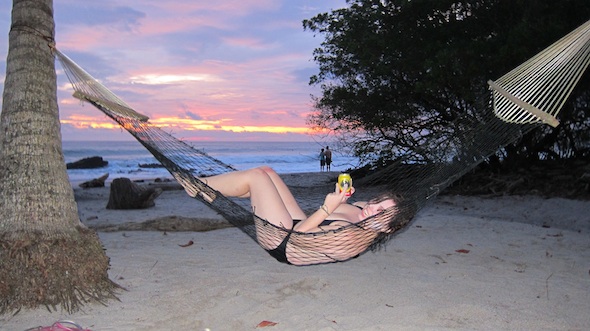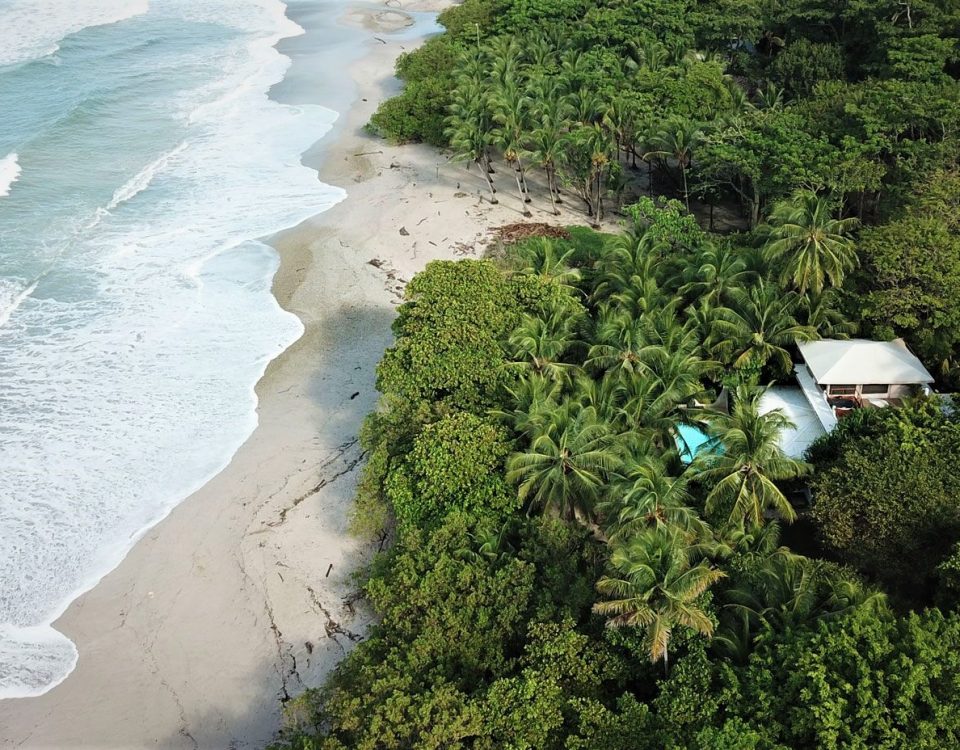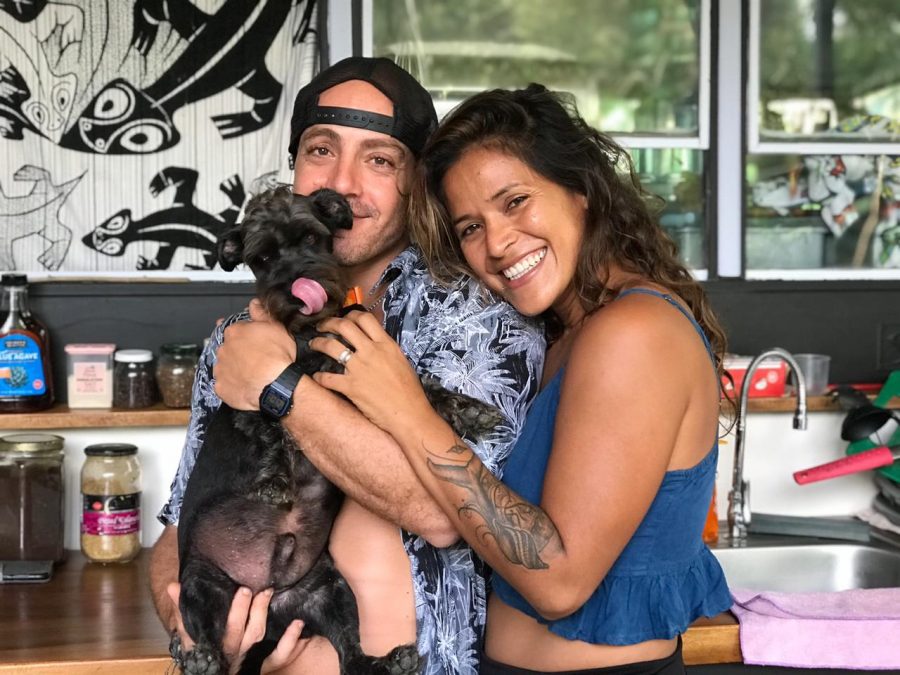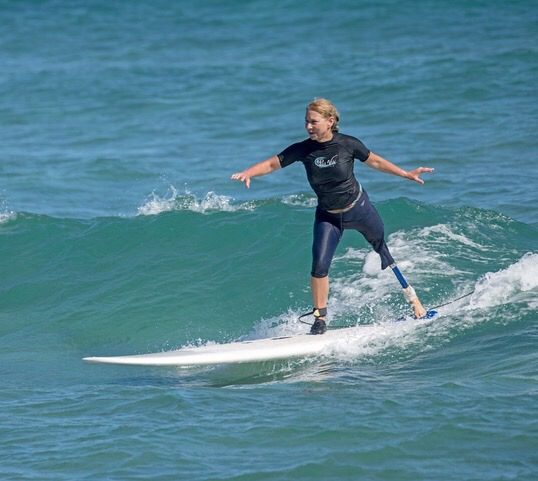How Surfing Helped Me Balance My Emotions

Surfing and the Myth of Talent
March 20, 2014
Magical Moments Viewed Through the Lens
April 23, 2014How Surfing Helped Me Balance My Emotions

As a kid on summer swim team, I never wanted to be in the final relay. Those were the last events of the night, after the air had chilled, the sun slipped past the horizon, and the majority of my other teammates were already hanging out by the snack bar. Meanwhile, my coach would push me onto the clammy dock, where I’d gaze down at the murky green water, trying to psych myself up for the race, even though all I could think of was how cold I was, the muscles twinges in my leg, and why I even liked the sport in the first place.
But of course, as soon as the starting gun sounded, I’d dive in, and two seconds later, by the time I kick-kick-stroked to the surface, I wasn’t thinking about the cold, the pain, and the uncertainty anymore. And that’s why I did it—and really, why I loved swimming. By the time I began moving, everything in the outside world stopped mattering.
When my mom passed away—quickly, unexpectedly—of lymphoma when I was twenty-eight, it felt like the dive but without the surfacing.
Growing up, water had been my refuge. In my turbulent adolescence, my mom had even made a rule: I couldn’t complain about school or friend stuff until after swim practice. Normally, after a hard two-hour workout of swim drills, that would be enough to take the edge off whatever emotions I was feeling. Or, at least, to mask them enough from my mother, who didn’t understand how her daughter could be so volatile, so emotional, so much.
“Just put your head down and swim,” she’d say, stealing a phrase my swim team coach always said as a way to psych the team up for a big meet, get swimmers back on track from a giggly gossip session going on at the other end of the pool, or—yeah—force reluctant relay members onto the dock. But my mom used it for everything, long after I quit swim team. Disappointing meeting with a boss? Emotional upheaval following a breakup? Epic fight with best friend? The advice was always the same, and over the years, I got better and better at hiding my feelings in favor of just pushing through—the same way she did.
Which was why I showed up back at work three days after my mom died, and why I took on an ambitious writing project one month later. At my mother’s funeral, I had mingled with her friends, smiled at their stories. She would have been proud of me. That was head down and swim.
But it wasn’t as effective as it had been before. A few months after my mother’s death, I was out with my then boyfriend when I dropped my cell phone on the street. The glass screen shattered into five jagged pieces on the sidewalk. I sobbed hysterically as I looked at the wreckage, finally allowing him to pull me into a hug.
“I think you’re actually crying about your mom,” he said finally.
“I’m not, it’s just expensive to fix,” I said, pulling away.
Around the one-year anniversary of my mom’s death, I pre-emptively booked a surf trip with Pura Vida Adventures. I knew I couldn’t be in New York, surrounded by memories. I wanted to be somewhere where no one would ask how I was doing or call to check in.
The first few days didn’t go well. I thought my swimming background would be an asset, but those skills couldn’t help me balance on a wave or know the right time to pop up from my stomach to my feet. Every time I would try, my hand would slip off the side of the board, or I’d lose my balance and fall underneath the waves. By the end of the first day, a bruise bloomed up my ribs, the tops of my feet were rubbed raw from the board, and the skin on my neck was chafed from my surf shirt.
But my emotions were even more battered.
The last straw was three days into the trip. From the second I woke up, the date had been weighing on me all day. A year ago, I’d woken up excited and nervous to start the first day of a new job. I’d worn a new dress and two silver wishbone necklaces stacked on top of each other, and I’d been annoyed the night before, when my mother had cut our phone conversation short before I had a chance to ask her opinion on my outfit choice. She’d been having trouble catching her breath while speaking, but that was something that had become the norm with her lymphoma treatment. She’d told my brothers and I not to worry about it, the same way she’d told us not to bother visiting during the times she was admitted to the hospital—something that had become a more and more frequent occurrence in the past few months. She hadn’t even told her own mother she was sick, inventing business trips to explain her absences when she was actually in the hospital.
That afternoon, I got a phone call from my father on my brand new office phone. My mom had been rushed to ICU. She had a trach tube, couldn’t speak, and was drifting in and out of consciousness. It didn’t look good. I remember my hand flying to my neck and ripping off the two necklaces. At that moment, I’d known that she would die, soon, and there was nothing I could do.
“Is everything okay?” A new coworker asked, poking her head up above our shared cubicle wall.
I’d nodded silently.
Now, I was a year and a world away, but the same feelings of anger, fear, and helplessness kept bubbling up. How could I have not known how sick she’d been? That phone call, where I’d been annoyed that she didn’t seem to care whether I wore a new dress or my reliable skirt and blazer combo, had been the last conversation we’d ever had.
At surf camp, I kept falling from my board, becoming more and more angry each time. My surf instructor urged me to try smaller waves, suggesting that she’d hold on to the board while I got the hang of the pop-up motion.
“I’m fine!” I paddled a few yards away from her, wanting to do it on my own, annoyed with myself and the fact that I couldn’t stop thinking about what day it was. I hated how I was letting my emotions get the best of me. I felt vulnerable and weak as I got into position for the wave, looking over my shoulder, gritting my teeth, willing myself to just do it.
Instead, the wave overtook me. I tumbled off the board, getting my ankle tangled in my surf leash in the process. When I finally surfaced, gasping and angry, the board surfaced a split-second later, hitting me hard on the lip.
Blood ran from my mouth and angry tears exploded from my eyes. I hurried out of the water, practically threw the board on the sand, and stormed down the beach.
My instructor jogged to catch up with me. She grabbed my shoulder, standing squarely in front of me until I had no choice but to look her in the eyes.
“How are you?” she asked calmly.
“I’m fine,” I said, wiping away an angry tear that trickled down my face.
“You aren’t,” she said, shaking her head. “Want to tell me what’s going on?”
I didn’t. But I was caught off guard; the tumble from the board had made me feel more vulnerable than usual.
“Today was the day that my mom … went to the hospital. When her doctor told us she was going to die,” I explained, hating the way my wobbly voice cracked; the way the flow of tears had turned from a trickle to a full-on torrent as the memories from the previous year flashed into my mind: The two weeks in between that terrible phone call and her death, when I went out with friends, worked on a new book, only visited the hospital once. The week after her death, trying to pick out a sweater with my boyfriend in a department store I hated, feeling like the wind was knocked out of me when I realized I would never be in that store with my mother again, but then taking a deep breath and composing myself before he realized anything was wrong. Every memory was there, and every memory hurt far more than my still bleeding lip.
The instructor pulled me into a hug. I didn’t pull away. “That’s why you were having such a hard time in the water today. You were struggling with all of that. And that doesn’t work in the water. Because how can you honestly feel the waves if you’re fighting with your feelings?”
She let me go and told me to come back to the water when I was ready. I sat on a rock, pulled my still damp legs to my chest, and gazed out, watching surfers in the distance triumphantly crest a wave at the intersection of sea and sky. I wanted to be one of them—someone who fell down but could stand up again, who could say they’d been hurt and had the bruises to prove it, who understood that life and it’s emotions were far more like the troughs and valleys of an untamed ocean than the glassy stillness of an Olympic-sized swimming pool.
I didn’t bother to wipe my eyes as I reattached the leash to my board and re-entered the water. The rest of the afternoon, I allowed the waves to swell underneath me, feeling their power. Sometimes I popped up, most of the time I didn’t. It would be obvious to anyone on the shore that I was struggling, but I didn’t mind. Learning to surf was hard—why should it look like anything less?
By the end of the session, I was exhausted, bruised, and still more than a bit teary when other members of the surf retreat, who’d seen my earlier outburst, stopped me to ask if I was okay. But this time, I let the tears fall. I needed to experience the pain, inside and out. More importantly, I needed people to see it, and realize that showing vulnerability wasn’t the weakness my mom had taught me it was. That, while swim-it-out works for getting over the tiny ripples caused by every day dramas, sometimes, life hits you with an oversize wave that’s impossible to ride gracefully. And when that’s the case, it’s all right to cry, scream, and seek support wherever you can get it. The tumbles and pop-ups of surfing helped me tune into my emotions, and finally allowed me to surface.
This article was adapted from Fitness Magazine. You can follow freelance writer Anna Davies on twitter @annakdavies.






4 Comments
This is beautiful. Thank you for diving in and sharing your story. Brings to mind one of my favorite quotes by Isak Dinesen.
“The cure for anything is salt water – tears, sweat, or the sea.”
What a beautiful piece. I was at your surf camp and remember how strong, kind and full of life you were that week. I had no idea.. Thank you for sharing this. You’re a brave and beautiful woman – facing it all and feeling it all. Soul surfer.
Thanks so much for your comments; it means a lot. And surf camp was so huge for me back then … it was exactly what I needed. Right now, two years later, I’m actually spending the month with a friend in Tamarindo, renting a board every morning and surfing for an hour or two. I can actually stand up and ride waves (sometimes!) now. I still have moments of frustration that I have to ride out, but I love that there’s always another wave and for every time you tumble underneath there’s one that just works … Pura Vida!
Great article! We will be linking to this great article on our site.
Keep up the great writing.discount jerseys Chinahttp://forum.powertrotzhandicap.de/discussion/10513/interesting-facts-to-understand-about-the-football-shirtshttp://www.auroescents.com/afl-merchandise-the-best-gift-for-aussie-football-enthusiasts/